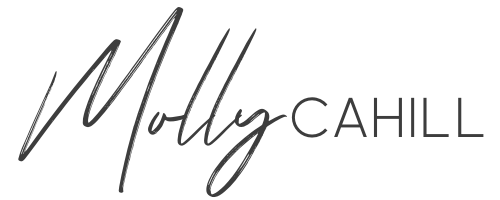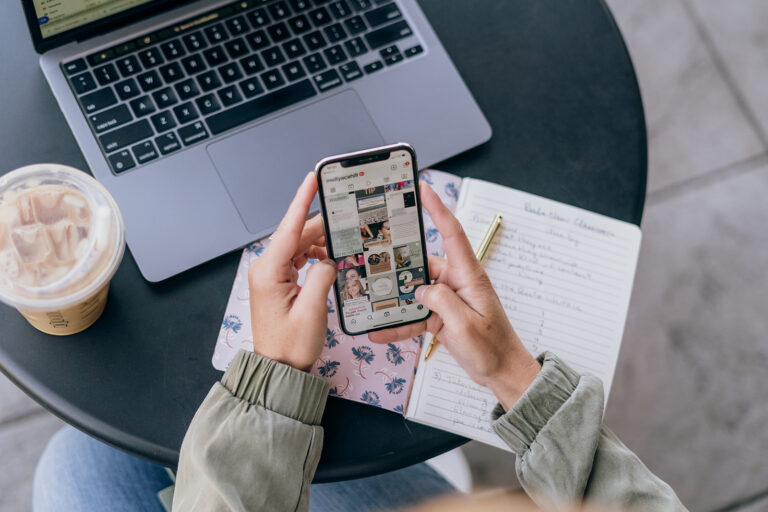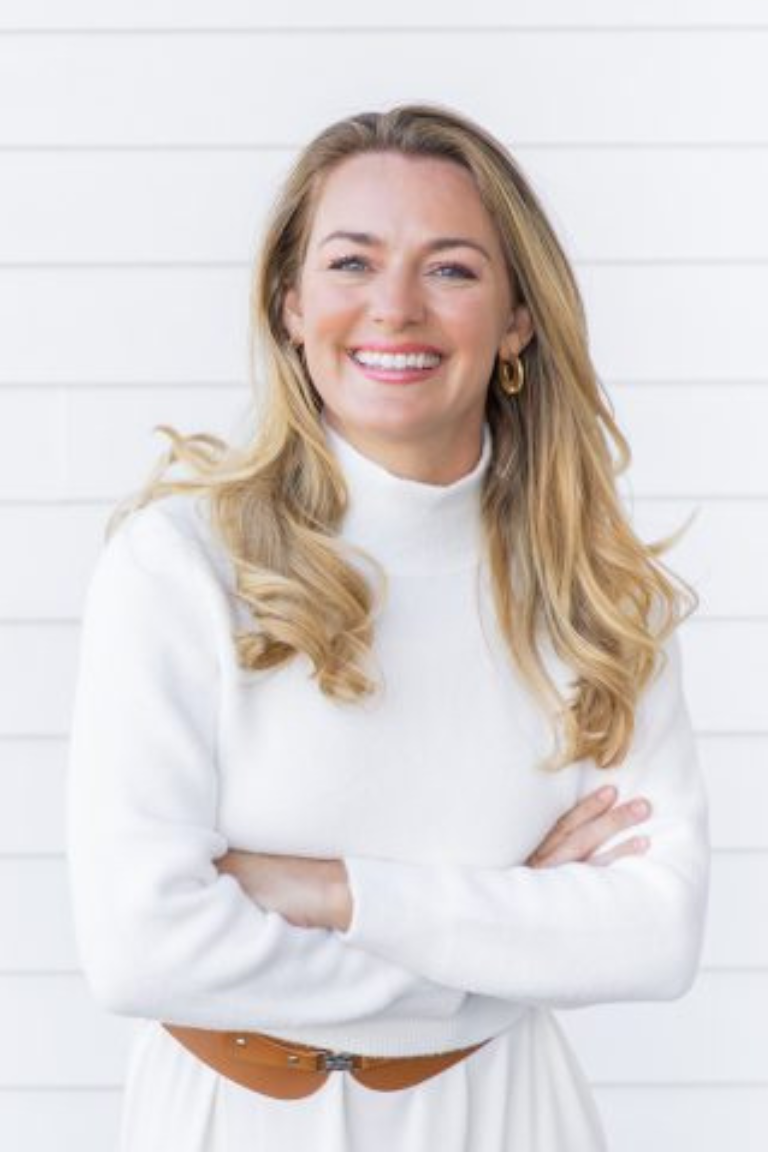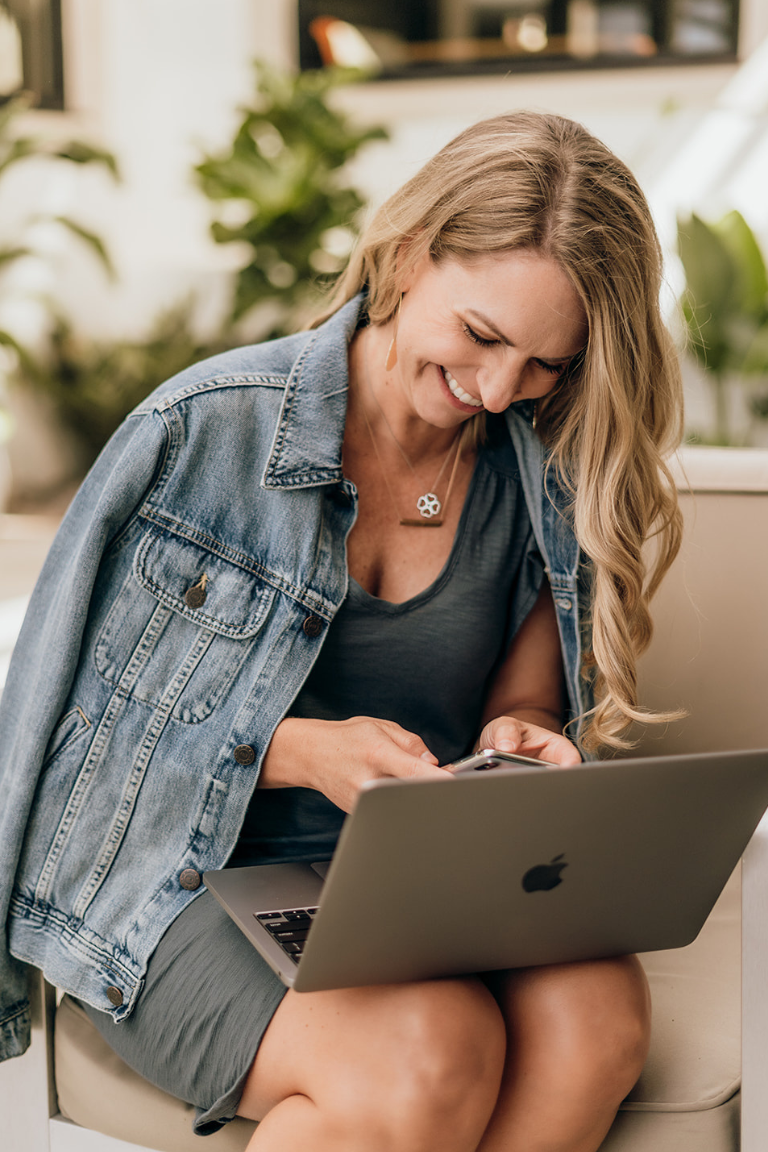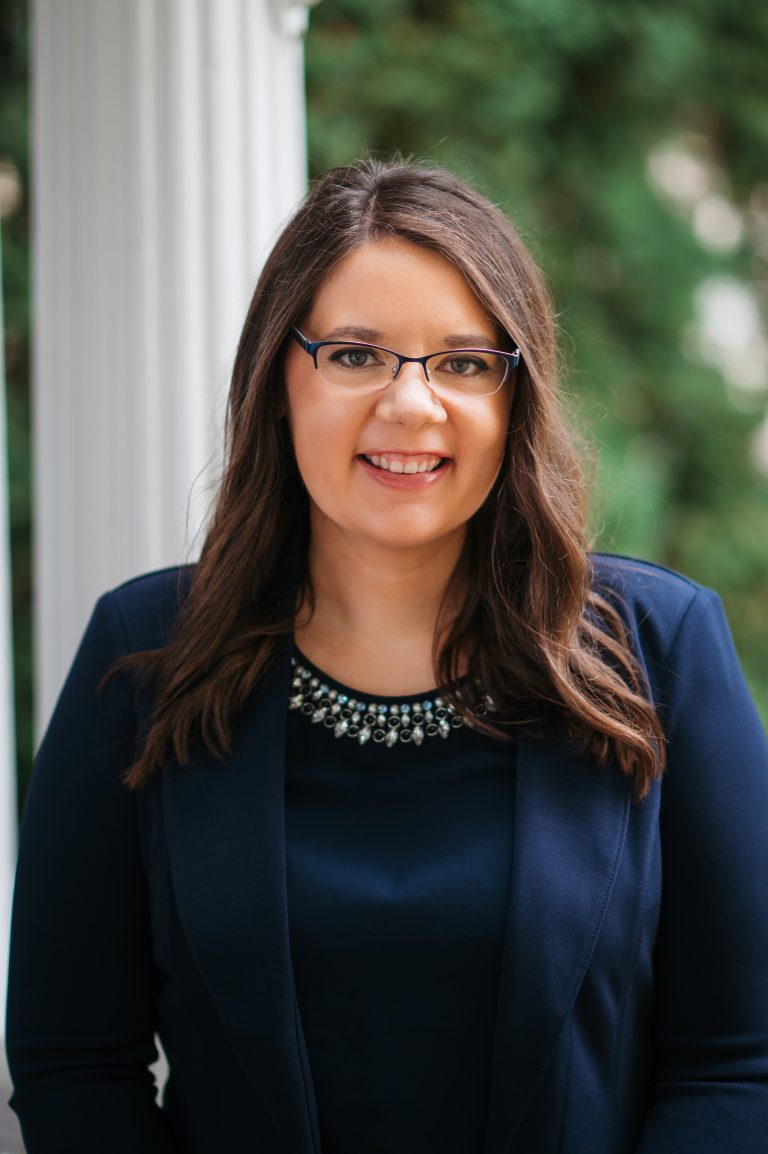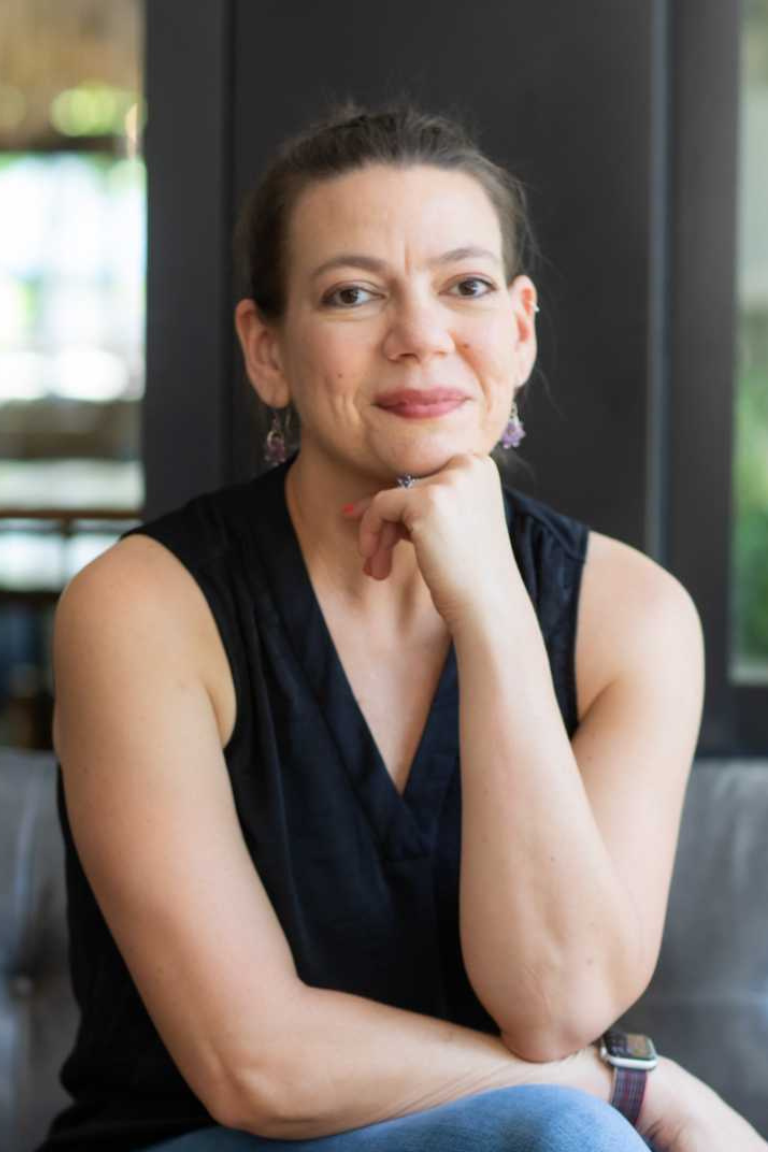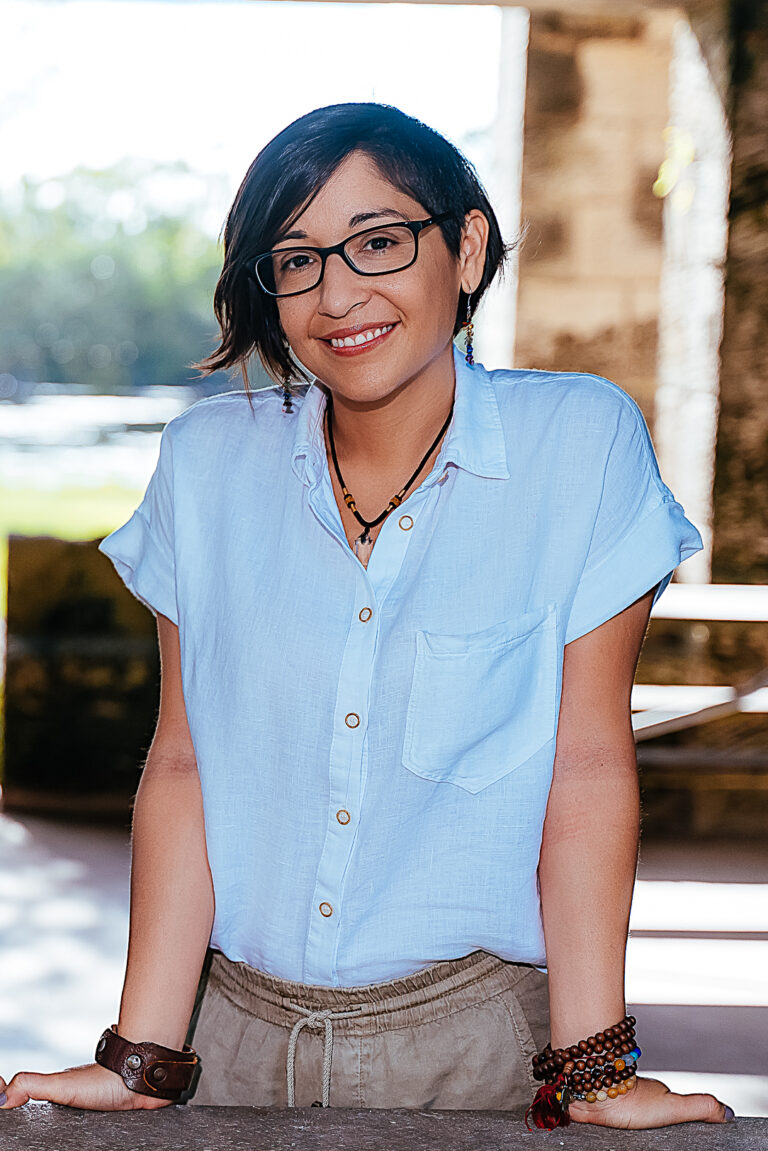Episode 20: Converting Followers into Paying Clients
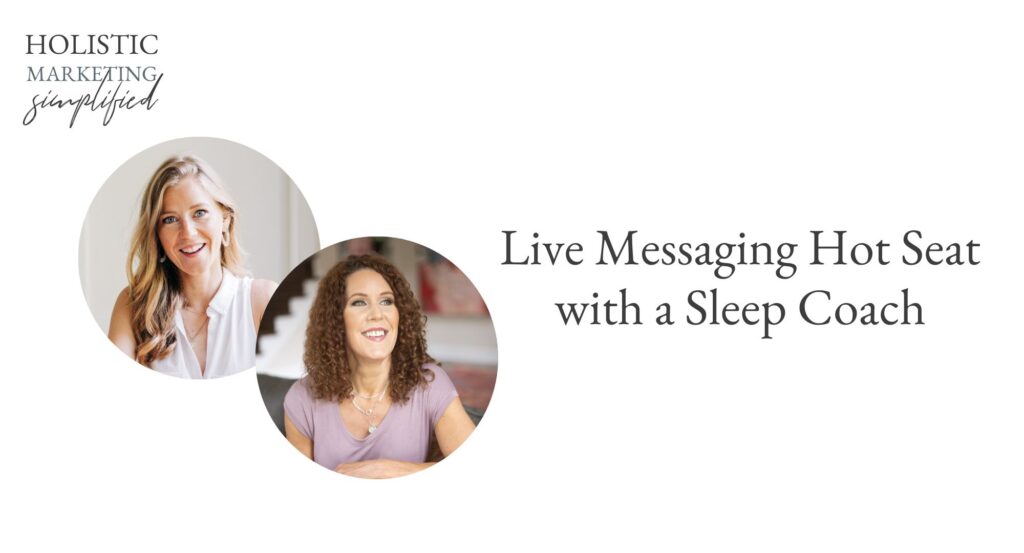
Subscribe on Your Favorite Podcast Player
Apple Podcast App | Spotify | Stitcher | Google Podcast
Do you struggle to get more patients or clients into your practice or virtual coaching business?
Maybe you have a large, engaged following on social media, but you can’t seem to convert them into paying clients.
Trust me – you’re not alone, my friend!
In the second installment of our podcast series with a business coach and messaging maven, Kate Matheson, we helped health and sleep coach Morgan Adams create the core messages and bio to convert her dedicated followers into dream clients. (You can catch the first episode with a nutritionist here.)
Read on to learn how Kate helped Morgan master her messaging!
About Morgan Adams + Her Business
Morgan Adams is a sleep coach for health-conscious women.
She feels passionate about sleep because she once had insomnia, and she expertly uses her personal experience to connect with her social media followers and clients.
Her clients value a holistic approach to wellness and healthcare and have tried all the DIY approaches to catch some Zzzzs.
The Problem: How to Get More Clients as a Sleep Coach for Women
For the most part, Morgan is doing a lot of things right.
- She’s killing the social media game. She attracts followers who regularly engage with her content.
- She gets in front of the right people (and a lot of them!) as a guest on numerous podcasts.
- She shares her personal story of insomnia, and it attracts clients she enjoys working with.
- She stays in her lane and knows when to refer potential clients to other practitioners.
But her efforts aren’t converting her engaged audience into enough paying clients.
“I don’t have a constant influx of clients right now. It’s kind of low. And it’s never really been a high amount of clients at once … I feel like something is just not landing, and I can’t put my finger on it,” she said.
Since sleep coaching is a relatively new field, there’s a bit of a knowledge gap. “Sometimes I forget not everyone understands what we do, so I suppose I could be more clear,” Morgan said.
Kate also pointed out that there might be a credibility issue since sleep coaching is a new practice.
How to Get More Patients Into Your Practice: The Solution
After learning more about her business, clients, and marketing efforts, Kate used her messaging framework to encourage Morgan to …
- Define the myths and misconceptions about insomnia
- Define and explain sleep coaching and her unique, science-based approach
- Highlight her unique qualifications and address the credibility gap
- Define her scope, and
- Articulate the benefits and outcomes of her coaching
This “to-do” list will help Morgan create an “I get you” statement and bio that she can use across multiple channels to attract and convert her ideal clients.
Finally, Kate also suggested Morgan reevaluate her sales strategy, and I advised her to incorporate more social proof and case studies into her content efforts.
The End Result
Kate helped Morgan create 3 core messages:
- You DO NOT have to take pills to be able to sleep.
- What most people think causes their insomnia is wrong. And many of the things we do to “deal” with insomnia actually perpetuate it.
- Life is just better when you get a good sleep.
They also developed a credibility story to help her attract and convert followers into clients.
“It’s really, really helpful to get another set of eyes [on my strategy],” Morgan said.
In the third episode of this podcast series, Kate and I chat with Dr. Zephanie Cole to help her develop a marketing strategy for the online component of her well-established brick-and-mortar chiropractic practice.

The Holistic Marketing Simplified Podcast is brought to you by Holistic Marketing Hub, our hybrid program that supports you with personalized coaching, caption templates, and virtual classrooms. In this program, we teach health and wellness professionals how to fish, but also bait their hook! Head to holisticmarketinghub.com to learn more and use code PODCAST for $100 off!
Make sure you’ve hit that follow or subscribe button on your favorite podcast player to get notified each week as we air new episodes!
Connect with Molly
Instagram | Facebook | Youtube
Mentioned in this Episode
Amy Porterfield’s Podcast Episode
Connect with Morgan
instagram.com/morganadams.wellness
Connect with Kate
Molly Cahill
Though Welcome back. This is part two of a three part interview series. Back in episode 10, I interviewed my friend Kate Matheson, who is a business coach for health and wellness entrepreneurs, mostly brick and mortar, and she has this really, really amazing gift for helping practitioners hone in on their messaging. So in Episode 10, I'd casually mentioned Hey, it'd be fun to have someone on live to kind of go back and forth and like work through like, see what it looks like in real life in real real time to work through messaging with one of your students, and three amazing brave women volunteered. So last week's episode, if you didn't catch it was with a nutritionist named Valerie. And this week's episode is going to be going over a messaging back and forth with my friend Morgan Adams, who is a sleep coach for women. And her business is pretty much all virtual. So I think it's kind of cool that we've got like some brick and mortar into virtual. So let's dive into listen to Morgan's episode, I think you will take a lot out of it. Even if you are a brick and mortar only clinic, I think you'll learn a lot from just hearing how Kate walks through this messaging process. Welcome to holistic marketing simplified a podcast for helping moms professionals looking to simplify their marketing. I'm your host, Molly Cahill and this podcast is brought to you by holistic marketing hub, our hybrid program that supports you with personalized coaching, captioned templates, and virtual classrooms. In this program, we teach health and wellness professionals how to fish but we also break their hook, head to holistic marketing hub.com to learn more and use code podcast for $100 off, you can find full show notes, resources and more. At Molly cahill.com/podcast. Five Morgan Hi, Morgan, thank you so much for being our guinea pig. Morgan is a sleep coach, which is cool, because it's like, Hey, everybody, everybody's problems could probably also be solved with their sleep. Right? Morgan is very, you do a great job on your Instagram. I think it's a great job online. So this is going to be excited to dive in.
Morgan Adams
Thank you.
Molly Cahill
Yeah, just go ahead and tell us a little bit about who you are, what you do. And what's troubling you today, Morgan,
Morgan Adams
to therapy session, I'm on the couch. Well, my name is Morgan Adams, I am based in Richmond, Virginia, and I am a Holistic sleep coach for women. I've been doing this for almost two years, my my business is called the Morgan Adams wellness. And I you know, really just feel like something is not landing completely as like, I feel like the clients that I do get are really good matches for me. So I think I'm doing a good job of attracting the right clients. I think because I share a lot of holistic wellness content on my Instagram. People look at my stuff, not just for sleep. But for other things too, like continuous glucose monitor exercise, like the whole, it's like the whole package of wellness. So I think that the clients who come to me are already very health minded themselves. A lot of them already go to naturopath, functional medicine doctors. So I often feel like I don't have to do a lot of educating on basic health stuff, which is kind of nice. But the I don't have like a constant influx of clients right now. It's kind of like, it's kind of low. And it's never really been a high amount of clients at once. I mean, I don't want to be overwhelmed, obviously. But I do. I would love to get more clients. And I feel like something is just not landing and I can't I can't put my finger on it.
Kate Matheson
Cool. Well, we'll get into it. Because you had mentioned. And I will say this, you know, you had mentioned in your in your email to me that like, you know, not everybody really knows what a sleep coach is. And so that can kind of be, you know, that can feel like a bit of a challenge. And you had mentioned just like at a talk about what you do and what sleep coaching is in a clear and compelling way. Like does that feel like sometimes the challenge for you?
Morgan Adams
Yes, sometimes it does. Yeah, because sleep coaching is a relatively new field. And maybe sometimes I forget that not everyone understands what we do. So I suppose I could be more clear. And in my messaging, I do talk quite a bit about insomnia. One thing I didn't share is that I did have insomnia for eight years. And I was dependent on prescription medications for that. And so I'm very open about that in my messaging on my website. And I do feel like there is a certain contingent of clients who are attracted to that they've told me and right retrospect, like, I got, like, it seemed like you would understand my my plight. And they they either are wanting to get off meds or they're trying to prevent themselves from going on meds. So that's why they why they ended up coming to me. So I do think I bring, I mean, there are definitely are other sleep coaches who've had insomnia for sure. But I feel like it does make me stand out a little bit in this space that I've gone through it myself.
Molly Cahill
It's in your breast cancer story too, right? I
Morgan Adams
mean, yes, I have had breast cancer twice in four years, the past four years. So there's that element, although, you know, there, I don't talk about it as much as I used to. But you know, there is, like, you can see that I've had health challenges that I've overcome, and I've come out better on the other side. So yeah,
Kate Matheson
yes. Okay. Um, and this is why I was excited to talk to you, because I feel like you have so many pieces that are that are actually working for you right now. Like, I think you are pretty clear in who you work with. And you do. Like, you know how I was saying, they're sort of like the two pieces of messaging you connecting with them, and then connecting with you, I think you do have like, you know, the you connecting with them, but we can clarify a little bit. And you kind of also have them connecting with you, right? You say people have like chosen to work with you because of your story. So they're resonating with that. Think maybe we want to one, amp it up a little bit. Just give you a way to chat about it that feels just like clear and concise. But I'm curious if you find there sort of like a credibility piece that can sometimes feel missing, because you had mentioned like you're asleep coach, but there's also like therapists and doctors and things like that. So do you find that that's a part of it or not really,
Morgan Adams
no one's actually outright said that to me. But it's just something that I've thought about because I think that the natural, like progression that I think happens when somebody has a sleep problem is they go to their primary care doctor, primary care doctor either gives them a sleeping pill or handsome a list of sleep hygiene tips, neither of which is really addressing the root cause. Yeah. And so if the patient returns to the primary care doctor and says, Hey, Doc, no, none of these things are really that helpful. I feel like the doctor refers to a sleep specialist. I don't think that the doctor, doctors, I mean, I'm trying to do this locally, but it's really hard. I don't think doctors really no sleep coaches are available. Yeah. And so they don't really like I'm not in their head of like, oh, let's let's like refer you to a sleep coach. Part of what I do in the beginning of the coaching, or actually, it's really the discovery call that I do this, quite honestly, as I tried to screen for other sleep disorders through a questionnaire, because I don't want to get into a situation where somebody signs up to work with me, and I come to find out they have a sleep disorder that I'm not qualified to deal with. So I have to really, I'm very open about wanting to stay in my lane, like I'm dealing with optimizing sleep and insomnia. Yep. You know,
Kate Matheson
unfortunately,
Morgan Adams
what I've seen come up a lot. Sleep apnea is really a big deal. So I've had clients come to me, we find out through working together, they have sleep apnea, so and they also have insomnia, so I have to refer them out. So yeah, there's I definitely am doing very, you know, doing my, my utmost to get these folks to different practitioners when they're not a suitable for me to see.
Kate Matheson
And that's like what we want, right? It's like, we want everybody to have their lane. But for everyone also to be very clear on what that lane is. So then patients know as well and other practitioners. So I love what you're doing. And the fact that it's like you can then refer to you know, people who are better suited for sleep apnea. But then let's figure out when you are best suited for people. So you said optimizing their sleep and insomnia. That's really your thing. So tell me a little bit more about like, what is their current situation? Like, what does insomnia look like for them?
Morgan Adams
They usually come in at their wit's end. They're usually like, I've tried all the things. I can recall, one client, having gone to a therapist, who put her through a course of cognitive behavioral therapy for insomnia. And the client was just broken and broken down. Like, oh, gosh, you know, she was so stressed out because the doctor would have her stay up to like 1am. And the patient my client was like, crying on her way to work because she didn't have enough sleep. And that's when she found me she's like, I needed someone else. So then another client went to a sleep doctor who was not very helpful. So, sometimes they've already like I would say, half the time at least they've tried other professionals that didn't work out for them. But then there are a lot of people who they've done the DIY approach, they've just like a laundry list of interventions. They've tried on themselves like what? Maybe sleeping pills, CBD,
Unknown Speaker
melatonin,
Morgan Adams
melatonin, you know, they've like got their blackout curtains, they blue light blockers, yeah, they'd like, you know, they, they, I had a really interesting lady who was a nutritionist, she was at Functional Diagnostic Nutritionist. And she was I mean, her diet was impeccable. And what what I helped her understand was that your diet isn't creating your insomnia, it's your anxiety. You know, so helping people really like get out of there. They have blinders on, they have blind spots, and helping them see that it what they thought originally was the cause of their insomnia. Really, it wasn't pretty good right there, by the way. Okay. Yeah. And quite frankly, most of the people that I see are dealing with a significant amount of anxiety and stress. So I'm having to weave a lot of mindfulness into what we do, as well.
Kate Matheson
Okay, I love this. I just wanted to go back to Oh, yes. So all of these DIY approaches, like we've all heard them, Molly, we're not we're listing them all off, like, well, we know them. So why don't those would necessarily work for people?
Morgan Adams
Well, I think it's because there's not a quick fix for insomnia. It's it's a very multi layered approach. And sometimes they are going to bed at the wrong time getting up at the wrong time. There is a lot of the things that people do to deal with their insomnia, actually perpetuate their insomnia, and they don't realize it. So the CBTI methodology, which I incorporate brings that to the surface, so we are altering bedtimes and wait times, things that they can do in bed, things they can't do in bed. So it's it can be a fairly regimented process. So they haven't they haven't usually gone down that route. Because it's it's slightly hard to do by yourself. Yeah. Okay.
Molly Cahill
Follow up question. You said things. They don't realize they're making their insomnia worse. Do you want to list out some of those examples?
Morgan Adams
Yeah, like, having more caffeine to stay alert, sleeping in, taking naps, going to bed really, really early to, quote, hopefully, you know, get a full night's sleep.
Kate Matheson
I do that.
Molly Cahill
I know, not me being guilty of that. I don't go to bed really early. But the other thing is I'm like, oh,
Morgan Adams
like, like, waking up at 3am being anxious and then trying to relieve the anxiety by scrolling Instagram. Yeah,
Kate Matheson
yeah. Okay, all these Omega things. Oh, my God, like going back to I get you statements, you have so many things that are like would be just amazing for it. So I like can't wait to try and put this all together for you. So what are some of the like two to three main benefits or results or outcomes that you have seen? Or your clients have seen after going through these processes with you?
Morgan Adams
Yeah, I would say the the main thing is, which which is what they come to me for is they are getting a better night of quality sleep on a more consistent basis. Their sleep is more regular. There's not as many like feast or famine types of situations. And then because of that, they are able to have more energy during the day better mood, things are just going better for better for them during the day. Their life is running more smoothly.
Kate Matheson
I was just gonna say life runs better when you get a good sleep, right? That's Yes.
Molly Cahill
I was just gonna say to do you feel like oftentimes, like sleep is either a seen as like, well, it's not sexy. Give me like a cool supplement or something. Yes. Like, it's like, Oh, don't tell me to get sunshine and drink water and sleep like? No, I was looking for a fancy new supplement. That's like sometimes it almost is like, so obvious that people think that it's not an issue. Does that resonate at all?
Morgan Adams
Or no? Yeah. Well, yeah. I mean, some of the interventions that I like one of my top two interventions is, you know, getting sunlight in the morning and having a consistent wakeup time. Those are the most unsexy things out there. So when people are regular with those things, they often see quite a bit of improvement. Okay,
Molly Cahill
yeah. And I don't want to put like words in your mouth. I just know like, for example, this morning, I was literally on a group call with my health coach, and one of the women on the call, like she's like I'm having a better day today. I gotta look like there's a lot of hurt her issue was sleep. I feel like There's so much anxiety, especially around people who are insomniacs, like when it comes, it gets closer to bedtime. Yeah, they start to get anxious.
Morgan Adams
Yes, that's very common. Yeah, yeah. And
Kate Matheson
so like you had mentioned initially, like, you know, other people work with insomnia as well, right, their sleep doctors, there's therapists even. So, how did you find that you are your approach is different than some of those?
Morgan Adams
Yeah, well, I feel like, mine is a lot more. I mean, I can't, I can't say for sure, because I haven't been in these other people's shoes. But I really tailor things to the person and I really have like a multifaceted approach. You know, I'm looking at their, their diet and their exercise and their their daily patterns, their bedroom, what's going on, in their lives, and I'm not sure that I'm not sure to what extent the doctor would be honing in on all of these things. Another thing about the the coaching that I think really shines is that you are accessible a lot more easily than a doctor. So I have with my sleep coaching, we work through something that I'm sure y'all both know, it's, it's called practice better. And you can message people back and forth. And I tell my clients, you know, like, you can message me anytime you have questions, if you're struggling, so that they always feel like they can reach out and get an answer pretty, pretty immediately. Whereas with like, with a doctor, it's like, you know, it's harder to get. I mean, these sleep doctors they are. They're overextended. They're not many sleep doctors to provide services for all the people who have insomnia, there's waiting lists months long. So if you have insomnia, and you have a sleep doctor, you're not going to hear from them. If you have a problem within 24 hours. I mean, maybe some I mean, I'm just, but I'm just thinking of, like, mostly doctors out there probably don't have the accessibility factor.
Kate Matheson
Yeah, I love that. Because that can be seen as a, I don't know, maybe insignificant thing. But when I'm thinking about it as like your approach, like I'm thinking about it in language terms, it's like, you know, I'm not putting you on a monthslong waitlist to see a specialist that's just gonna give you a prescription that you don't want to or need to be on. Right? I'm a real person who has really gone through this. And I'm really here for you every step so that we can look at your daily patterns, really see what's going on, and start to make, you know, lasting change. So you can get a good night's sleep, feel less anxious, blah, blah, blah, right. But anyway, I love that for your part of your approach, because people will be like, Yeah, I don't want to be on a month long waitlist just to get that right. Is there anything else you don't do that you're like, that doesn't resonate with me? Or that's not my style? Like, you know, I, you know, I see maybe doctors doing it or therapists doing it, but that's just like not my style, or other sleep coaches are?
Morgan Adams
Hmm, that's a good question. Well, I mean, I guess based on one of my clients feedback that I just mentioned, the sleep doctor basically had her on this very regimented schedule of, I mean, she was following CBTI, which is, you know, one of the bases is compressing sleep, to make it more high quality. And there's a formula, it's a mathematical formula, you follow. And so this client was supposed was given directions to go to bed at one o'clock. And I mean, and get five hours of sleep because she was spinning, she was they were trying to consolidate her sleep, they were trying to get like, things worked out. And I mean, I just feel like, in many ways, it seems kind of inhumane to follow it to the tee all the time. And yeah, basically, my client asked the doctor like, this is really distressing to me, I cried on the way to work, can we can we recalibrate the schedule and make it so that I can go to bed a little earlier, and the doctor was not willing to bend? It was like her way of the highway. And that to me, hearing my client telling me that that was like a huge lesson for me, in the future, if I get tempted to like, be very stringent with these women, like, it's gonna backfire. They're gonna cry, like,
Kate Matheson
I don't want already feeling stressed.
Morgan Adams
I mean, I don't want to contribute to their anxiety. Like I My job is to help alleviate that. So, but then again, that's an n of one that's one therapist.
Kate Matheson
And it's, I was gonna say, it's never about saying, like, you people, other people do this, and I do this. But when you start to point out examples of what someone might have experienced before that you don't do, or examples of what you do, again, people can start to resonate with your approach and be like, Yeah, I vibe with that because I was on a super rigid schedule that left me more stressed and anxious. And I really want my stress to be alleviated. Right. So when you say like, my style is not about leave, you know, giving you rigid schedules that leave you more stressed and anxious. I'm here to help alleviate your stress by creating, you know, custom tailored routines that, like we can adapt into your lifestyle or whatever it might be. These are all really good things. You, you made me think of something else for you. Ah, yes. So, you have been doing this for two years, and you dealt with an insomnia for eight years yourself? Is that right? Yes. So this has been like a decade long process for you? Well, yeah, that
Morgan Adams
well, the insomnia happened like 17 years ago. Ah, okay. So there was longer than there was a long there was a long gap between the insomnia stopping and me doing sleep coaching.
Kate Matheson
Yeah. And so how long because I want to create a bit of credibility for you. And time or numerical data is like, the easiest way to do that, right? Have to create quick credibility for you. So I'm curious, like, yeah, how long have you been studying, practicing and guiding people on sleep? Those three things together?
Morgan Adams
Two years. When I say I fix the insomnia, like I didn't? Well, it's kind of a two part story like 17 years ago. I just, I tapered off my sleeping pills. And that was that like, that was all I did. Ah, okay. lickety split. I mean, it wasn't lickety split. It was difficult to do. Sorry, it wasn't 17 years ago, it was I was on the pills for for eight years. And then eight years ago was when I sorry, i Okay, so when I was when I stopped taking the pills. Yeah. And then when the pandemic hit, right, in March of 2020, I started to have sleeping problems. Again, they resurfaced, and that's when I started researching sleep, because I didn't want to take pills anymore. Like, I didn't want to go back to taking pills after being off of them for like, you know, six years. Yeah. So that got me interested in the science of sleep. And it became so passionate, like, such a passionate subject for me that I was like, I have to make this into something where I'm helping people on a larger scale.
Kate Matheson
Yeah, I love it. So it's very interesting that you were so so easy for you to like, Why do you think that you were just so able to taper off? I mean, no, no, it wasn't easy, but taper off the
Morgan Adams
the pills. I think because,
Morgan Adams
like my husband, who was my new boyfriend, then was really supportive. I had somebody in my corner who was like, he was the one who brought up the fact that he felt uncomfortable with the fact that I was like, a zombie when I took the pills. And he's like, hey, you know, you kind of act like a zombie when you take these pills. That's freaking me out. And that was like, a wake up call. That was like someone calling me out like, this is not right. This is not good for you. And so that was like the impetus to get me to like, really? Take it seriously. And get off the pills. Because I've tried I tried before, but I always went back to them.
Kate Matheson
And love. I mean, I again, I didn't really look at your your story piece. But if you say you share it a lot. That's amazing, because you have a story that is so like it would resonate so much with with people. So I'm not surprised that others would would say that. That's why they
Morgan Adams
get to work with you. Just to kind of chime in. I've been on about 40 podcasts in the past year. Oh, my gosh, where I've shared that story. Okay,
Molly Cahill
there's that speaking of podcasts, Amy Porterfield just recently had, I'll have to pull up his name. And he talks about a conversion story versus an origin story and like the little nuances and the two of those things, and I got a lot from that episode. So we'll link that in the show notes. Well, I guess
Morgan Adams
my point to that was, and I don't think I wrote this in the email, Kate. But because I've been on so many podcasts. I really thought that was going to be a strategy to get more discovery calls. And it's gotten one discovery call.
Kate Matheson
Interesting.
Morgan Adams
And, you know, I've
Morgan Adams
that's been like, Okay, what's, what's going on here? Because I tell the story. And then I give like tons of sleep advice. And the podcast host will often say, I've gotten great feedback about your podcast, it's been downloaded a lot, but then like, where's the like, you know, where's the
Morgan Adams
ROI again?
Kate Matheson
Okay, before we before I ask my last question, and before we get into like, you will sum it all up. There's been a couple of things I've been thinking about for you as we've been going through this one, you know, for sure messaging can can always be improved. Like, I think there's always ways to improve it. But I honestly don't think yours is that is bad right now. Like, I think you have quite a bit of clarity around it. So sometimes when the messaging is like, there, or mostly there and you're still not seeing things, it's actually there's two other little pieces to it. One is, maybe you're not getting in front of enough people or the right people, but you've been on 40 Plus podcasts. So it's probably not that the other piece is like maybe the sale system after the call to action, this the kind of sales piece is not quite as strong. So even for example, Molly saying, you know, Kate, do you want your your masterclass to be, you know, promoted on this? Like, I generally don't send people to my website, I generally don't have them book a free call, I generally send them to my masterclass because I know it's like a really clean system that leads people to working with me not to say you have to have a masterclass. But then I see the ROI. It's an E, so I feel like maybe that could be it for you. But the and then the last piece that I think we actually didn't touch on it so much, because now I'm seeing that it might be the piece for you is, you said in the podcast, that you share your story, boom, that's going to resonate with people. And then I gave all kinds of education and tips, education and tips are super great. And it's nice to do that on podcast. But what actually gets clients I find is not the education, but the information. And so I find informational stuff. It's what I call like the MythBusters the like truth bombs, the things that shift people and make them realize that what they're doing is not helping them and why they might like the mistakes, the Metcons misconceptions, the myths, so all the stuff that you were saying about like, the DIY approaches, why those don't work. All the other things basically like why what they're thinking, doing, believing is not supporting them and what they want to be thinking doing believing instead. And then again, you say, This is why I do it this way, right. But I feel like that could be something to maybe amp up a little bit more for you is like, again, we don't want to be raid people on their mistakes. But you really need to make people understand why their current situation is their current situation, why it doesn't have to be and I think mistakes, myths, misconceptions. Those it's like, the more you focus on those, the more you'll actually get clients. I see it all the time. Does that make sense?
Morgan Adams
Yeah. And I guess, you know, for some podcasts that gets brought to the surface, because the pod a lot of times, it's what the podcaster asks, like, what are the top mistakes? You're saying people make more? But I do I do try to provide each podcast guests with a list of questions that I'm usually asked. And it's, you know, maybe I need to change that list of questions. Because a lot of that I like to focus in on women and sleep like Why are women struggling with sleep more than men and midlife especially?
Molly Cahill
So but yeah, shouldn't question what's
Molly Cahill
usually that sorry, if you covered this, what's usually the call to action in the podcast, like if they let you have a free download or like something like that, from the episodes,
Morgan Adams
there's been an iteration. So in the beginning, I had something called the sleep sanctuary checklist, which I now is now no longer it was my it was my lead magnet. And it was very weak. Like it was like a checklist of things to look for in your bedroom. And I realized that was weak, I got rid of it. So the call to action had been that it had also been book a free clarity call. And now, over the past month and a half I've had I've been saying, take my free mini course this the sleep reset solution, and the mini course. I mean, I don't think I really don't think any podcasts have been out since I made that call to action. So we'll see what happens but but the course has been downloaded a lot. I mean, people a lot of people have signed up for it. I do some talks for other health coaches and their private communities. And that's generated a lot of interest in me and my account and my course but it hasn't, like we haven't quite seen those results and discovery calls. So
Molly Cahill
I think a lot of it too is going back to like what we talked about with Valerie and the nutrition piece. It's like, you know, there are the people who especially if you're getting a higher level of person who kind of knows it's like, I know what to do, but I'm not doing it. Do you feel like you get those people to Yes,
Morgan Adams
I do. I definitely do. I'm
Molly Cahill
like the word partner comes to mind like I'm your partner on this like I'm here. Yes, that's where that just say shame on you. You didn't do what I said but do like okay, If this isn't supportive of your lifestyle, why Okay, yeah, that's fine. Something that is,
Morgan Adams
yeah, that's where like the true coaching comes in. And that's where, you know, because you're right, like a lot of these clients, they know what to do. Like they're very high level, they know the right things, but they're just like, oh, okay, I was scrolling again. Yeah. And they need somebody just kind of look at be looking over their shoulder and checking in on them. And once they develop the habit, it's a lot easier to kind of just be on autopilot. Yeah,
Kate Matheson
these are the types of things I think, again, it's like, even a bit more specificity is also helpful for you going even beyond the insomnia to, like, describe these things that you've just said, right? It's like, I know, you know, the the basics, right? Like, you're, you've been trying all these things. But here's, you know, how we can help. So I, you know, I actually just have, like, so many ideas for you, that I'll make some notes for you. But I think for you, again, like having coming back to maybe like a clear bio or something that it's, I also thought I meant to ask you, like you mentioned science a lot. But then you use holistic. And I wonder if people might resonate with science backed or like more, more speaking science. But anyway, that's a whole other thing. But like, you know, I'm a Holistic sleep coach for women. And then I think I tend to see women who are or women often come to me when, because you said that a few times, right? Women often come to me when they've been struggling with their sleep for a long time they've been they've been seeing different practitioners for it, they've been on the pills, they've been trying some of the DIY stuff, and they are ready to stop messing around with the blue light glasses and the XYZ and are ready to really have a partner in helping them create blah, blah, blah. And again, then we go back to my approach, my approach is maybe a little different than what you've maybe tried yourself, or what you've experienced with a sleep doctor. I've spent the last, you know, I spent eight years dealing with my own insomnia, and the last two years researching how I never have to go on sleep pills again, or like how I can stay off sleep pills forever. And then you can kind of go into, you know, a little bit more about your approach. And I'll leave you some some notes.
Kate Matheson
There's so many things actually, for you. But
Kate Matheson
I don't know, some of this field. We've talked about a lot of things today. Oh, yeah.
Morgan Adams
I mean, I think it's been great. I think this is it's really, really helpful to get another set of eyes. Because when you're working in it, you tend to get kind of narrow focused on the minutia.
Kate Matheson
Yeah. That's why I love doing this stuff. And I was gonna say, I honestly feel you're doing a lot of the things right. Like, it's sometimes I think, maybe getting up kind of just like, tweaking all the dials, right. So turning up a little bit, how specific you are in the situation, the women are in turning up the dial a little bit on your credibility and your approach, right? Think turning up the dial a little bit also on when someone should come to you versus a doctor or specialist. So that was one of the questions I want to ask you, but and then maybe turning up the dial just a little bit more on the myths, misconceptions, mistakes. And it's kind of just like a tweak, tweak, tweak tweak of everything. And it kind of takes it to like a, you're ready, like you're ready to kind of go to that next level, which is not necessarily an overhaul. It's sort of like a refinement, if that makes sense. Yeah, that's
Molly Cahill
Yeah, yeah. And one little thing, have you ever, because you get lots of engagement on your Instagram, but I have a free content ecosystem? Have you ever looked at my content? Because it's because I'm wondering, do you have I should have looked at this before? But do you have much social proof or case studies at all? I did,
Morgan Adams
to highlight with some case studies like client testimonials and things like that.
Molly Cahill
Yeah, they should be though, like
Speaker 4
literally. So all the posts, education.
Molly Cahill
Educational is, is one of the content themes that I teach, which is what you're great at. Like, for example, I just remembered your melatonin supplement posts. I learned a lot from that. But literally every five posts or so you want to be incorporating some type of case study or social proof showing that you are doing the thing you say you do, even if it's you B roll video of you typing on your computer, and you're like, coming up with a customized plan for this client who works night shift. So cookie cutter advice didn't work for I mean, obviously, you know, do it based on the clients you've seen, or whatever. But I think that's one little piece because your Instagram is fantastic. But that's one little thing I would add. And then I would also add in just more direct
Morgan Adams
pitches. Yeah, okay, yeah, I'm I'm gradually getting there. I
Molly Cahill
would just say Morgan, I would put up a graphic that says, I have room for one client starting June 1. Like you don't it doesn't have to be hidden and cloak and dagger. I mean it can to like there's there's room for both right? There's room for like advertorial style where you're like, This is great in here. Let me teach you something. If you want to learn more come work with me. Like there's there's room for that style. But there's also room for just like, I have two spots open in June. Yeah.
Kate Matheson
And then this is where also and I get you statement work so well, right? If you are boo, boo, boo, boo, boom, boom, boom. Then this is exactly who I would love to work with. Yeah, book a free discovery. Okay.
Molly Cahill
Yeah. And when you can be specific with that, that almost creates FOMO. And people are like, Well, I'm not quite that person. But I want to be that person, can you?
Kate Matheson
And you will eventually start getting people who? Like molly, I'm sure this happens to to have like, Well, I'm not this, but I but I kind of am like, do you still work with that? And you're like, Yeah, for sure. Because again, people see themselves a little bit, and they're attracted to that. I get so excited at all potential for you. So I'll email you these notes and then some templates to Okay, great.
Unknown Speaker
Thanks so much. It's
Kate Matheson
been really helpful. Yeah, you're welcome. Molly, you're gonna have like, some serious editing to do.
Molly Cahill
Okay, I think it's gonna be three episodes.
Kate Matheson
I was like, Okay, I'm really sorry. Once everyone started talking. I never will I like I love hearing the stories. Because that's how you start to get some of the, you know, the magic. But then sometimes it's like, hard to be
Molly Cahill
No, I know, it's hard to be distinct. And I will just add one thing to hopefully this is helpful with the podcast, if you're having trouble and you don't have somebody to kind of do this back and forth, you know, dialogue with you. I always go back to your why. What is it called the six layers? Why are the seven layers What is it this however many layers of why? We're, it's like Morgan, you want to help women get better sleep? Why? Because blah, blah, blah, well, why? Because blah, blah, blah, blah, blah, why and it'll start sounding redundant because eventually distill it down.
Sara Wiles
In all of that is great data for your messaging as well. Amazing.
Molly Cahill
Thank you for listening to holistic marketing simplified, brought to you by holistic marketing hub, our hybrid program that supports you with personalized coaching, captioned templates, and virtual classrooms. In this program, we teach health and wellness professionals how to fish but we also baked their hook, head to holistic marketing hub.com To learn more, and use code podcast for $100 off, and hey, you know, every podcaster at the very end of the episode asks you to rate and review their podcast. Well, that's because it's super important. These podcasts take a lot of time and heart and effort to produce to bring you free information. So in order for me to be able to continue doing that, we need more people to find out about the show. So if you could please just take like two minutes out of your very busy day to leave me a rating and share this on your Instagram stories and tag at Molly a K Hill. That's c h i ll I would greatly greatly appreciate your support. I truly appreciate you so much. I know your time is valuable and I can't wait to see you in the next episode.
